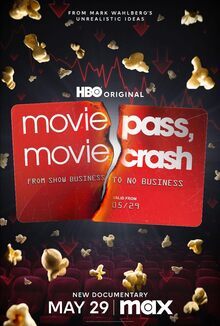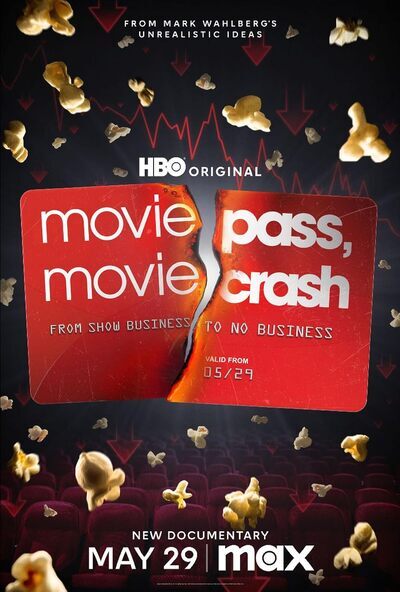MoviePass, MovieCrash

MoviePass, MovieCrash

Now streaming on:
JustWatch
For a few gossamer years in the 2010s, movie fans ate well—perhaps a little too well. That was, of course, courtesy of a little red debit card called MoviePass, the product of an ambitious startup that promised nirvana for any red-blooded cinephile with too much time on their hands: Pay a monthly fee, then use your debit card and an app to see one movie a day, wherever you want, any theater you want. If it seemed too good to be true, that’s because it was. After all, how could a company possibly make money off a $9.95/month fee, in exchange for up to thirty movie tickets that cost at least that much?
The secret, as Muta’Ali’s documentary “MoviePass, MovieCrash” reveals, is that they didn’t. And the reasons for such a bizarre business model (and the hardworking, idealistic employees they hurt along the way) are stranger than you might think.
Credit to Muta’Ali for finding an interesting angle on the material, which, ultimately, is about the rise and fall of a scrappy startup business—hardly the most cinematic of subjects, even if movies lie at the core of its business model. See, while we’re used to stories of venture capital ghouls and unchecked capitalist greed taking down even the most well-intentioned businesses, “MoviePass” recognizes its uniquely tragic nature as a cautionary tale for entrepreneurial racism: The story of two idealistic Black founders, their sensible idea for a buzzworthy company, and the greedy, old, white investors who stole it from them and spent it into the ground within a year.
If there are any heroes in this story, they are Stacy Spikes and Hamet Watt, two Black entrepreneurs who leapt wide-eyed into an idea to help save movie theaters by incentivizing participation through a subscription-based platform. Spikes, in particular, cuts an especially earnest figure, a shy, unassuming guy with glasses and a sensible head on his shoulders; we hear of his early days as a VP of marketing for Miramax, the creator of Urbanworld Film Festival, and more. Together with Watt, the pair endeavored to do what few Black entrepreneurs could do in the wide white world of business: create something that made a difference.
The trouble came when it came time for actual financing and the old, pale faces who could give it to them. This led them into the crosshairs of Mitch Lowe and Ted Farnsworth, who’d quickly maneuver themselves from financiers and advisors to replacing Spikes and Watt on the board and in the CEO chair in 2016. It’s here that MoviePass’s sensible, if unworkable, business model would rise beyond sustainability: it was they that suggested the too-good-to-be-true $10/mo offer, which would finally push the company’s subscriber base beyond the 20,000 plateau, and the parent company’s stock to new heights. In dueling interviews, Muta’Ali positions MoviePass’s ultimate fate as the tug of war between quieter, more sensible Black businessmen and the loud, greedy white vultures who steal their idea and suck the marrow from its bones until there’s nothing left.
From there, the doc proceeds down predictable though not entirely un-entertaining paths. Muta’Ali covers a lot of thematic ground here, from the sky-high expectations set for the company by Lowe and Farnsworth in one breathless media appearance after another to the cockamamie schemes they’d come up with to market the thing. (One particular boondoggle involves their inexplicable million-dollar installation at Coachella in 2018, complete with a helicopter-bound Dennis Rodman.) There are even a few bits of welcome millennial nostalgia about the promise of MoviePass, complete with former subscribers and even employees holding up their red debit cards as a souvenir of what once was.
If there’s a flaw to “MoviePass, MovieCrash,” it’s that these elements hardly elevate it beyond the boilerplate documentary structure formulas. Muta’Ali’s work primarily relies on a series of talking heads interspersed with archival footage and a few extremely crude animations to illustrate the skyrocketing, then plummeting, stock price of MoviePass’ parent company. Its structure is also a bit helter-skelter, awkwardly transitioning from 2016 to the company’s beginnings and beyond, with some clumsy transitions between these varying segments. And, by God, we have to retire the practice of documentaries starting with essentially a two-minute trailer for themselves, giving you the whole thing in microcosm before getting started.
The doc struggles to land on whether MoviePass was a predetermined failure or something that wasfailed, and the lack of participation in many of the key players for the latter hurts its ability to probe deeper. A running thread near the end implies that Farnsworth’s claim to fame as a big-time business mogul is built on hot air, but very little time is given to that semi-revelation. (Lowe, for his part, is the only one of MoviePass’s murderers who gets interviewed, and his cluelessness is at least perversely entertaining.) The doc even puts an opportunistic stain on Spikes, however inadvertently, as the closing minutes turn into an advertisement for his new book.
In the final stretch, we learn that there’s hope for MoviePass yet: Spikes bought the company back in 2021 and plans to run it the way it ought to have been run in the first place. With the state of moviegoing being as dire as it is now (dwindling attendance, even for films like “Furiosa: A Mad Max Saga”), and the belated adoption of similar models from AMC and Regal, here’s hoping he can find a way to make it work. But even this revelation feels like an afterthought in “MoviePass, MovieCrash,” instead offering a surface-level dissection of another startup that intended to disrupt an industry, only to burn up in the atmosphere of its own greed.
On Max now.

Clint Worthington
Clint Worthington is a Chicago-based film/TV critic and podcaster. He is the founder and editor-in-chief of The Spool, as well as a Senior Staff Writer for Consequence. He is also a member of the Chicago Film Critics Association and Critics Choice Association. You can also find his byline at RogerEbert.com, Vulture, The Companion, FOX Digital, and elsewhere.
Now playing

Queendom
Monica Castillo

Solo
Peyton Robinson

STAX: Soulsville, USA
Matt Zoller Seitz

Inside Out 2
Robert Daniels

Ghostlight
Matt Zoller Seitz

IF
Clint Worthington
Film Credits

MoviePass, MovieCrash (2024)
96 minutes
Cast
Stacy Spikesas Self
Hamet Wattas Self
Ted Farnsworthas Self
Mitch Loweas Self
Director
- Muta’Ali Muhammad
Latest blog posts

Tribeca Film Festival 2024: 8 Highlights from This Year’s Event

It’s Too Bad That Audience Pictures Like Ultraman: Rising Will Barely Be Seen in Theaters

Jesse Plemons on Being Funny, Stepping Off the Ledge and Making ‘Kinds of Kindness’

Don’t Check into MGM+s Hotel Cocaine
Comments
comments powered by Disqus



